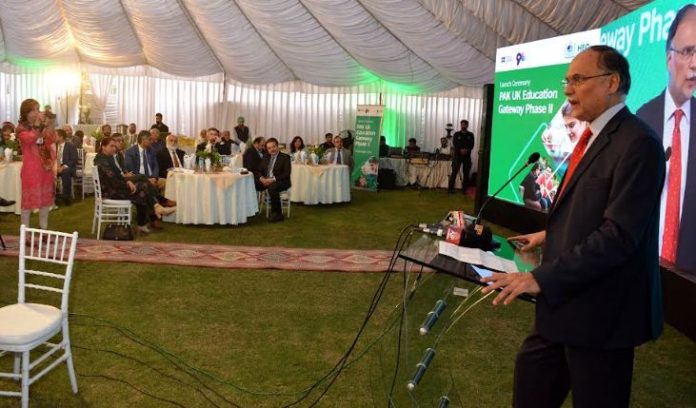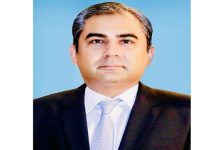ISLAMABAD, NOV 14: /DNA/ – The Higher Education Commission (HEC) of Pakistan and the British Council jointly organized the launch ceremony of Phase-II of the Pak-UK Education Gateway at the HEC Secretariat on Thursday.
Federal Minister for Planning, Development, and Special Initiatives, Mr. Ahsan Iqbal, was the chief guest on the occasion. The event was also attended by Ms. Farah Naz Akbar, Parliamentary Secretary for Federal Education and Professional Training; Chairman HEC Dr. Mukhtar Ahmed, Mr. Scott McDonald, Chief Executive of the British Council; Mr. Andrew Dalgleish, UK’s Deputy High Commissioner; Rana Sikandar Hayat, Punjab’s Education Minister; Mr. Mohyuddin Wani, Secretary of the Ministry of Federal Education and Professional Training; as well as Vice-Chancellors and officials from the British Council and HEC.
The program aims to strengthen bilateral collaboration between Pakistan and the United Kingdom in the higher education sector. Building on the achievements of Phase-I, launched in 2018, the second phase is anticipated to further fortify academic connections and joint research initiatives for a lasting educational partnership.
Scheduled to begin in June 2025, Phase-II of the Pak-UK Education Gateway introduces six key components to support Pakistan’s higher education goals, promote student and faculty mobility, and facilitate joint research efforts with UK institutions. These components include Research for Impact; Transnational Education and Mutual Recognition of Qualifications; Leadership and Governance; Scholarships; Women in Higher Educatio; and Faculty Development.
Phase-I of the Gateway, valued at approximately PKR 1.97 billion, yielded significant achievements. These included funding for eight collaborative research grants, resulting in 27 patents and 47 academic publications. Other key highlights were the training of 275 PhD supervisors, leadership development programs for over 40 Vice-Chancellors, and 200 academic fellowships.
In his remarks, Federal Minister Mr. Ahsan Iqbal acknowledged the British Council’s valuable support in formulating the Quality Assurance Framework for Pakistani universities. He expressed optimism about the continued success of the Pak-UK Education Gateway and emphasized the need for further collaboration between the UK and the Government of Pakistan to raise the country’s tertiary education enrollment rate above 13% in the coming years, aiming to match the educational standards of regional competitors.
He proposed initiatives such as customized training programs for faculty, increasing the number of UK-qualified PhDs in Pakistani universities, and exploring postdoctoral opportunities in the UK for existing Pakistani faculty members.
The Minister also stressed the importance of investing in quality education, particularly when sending students abroad for higher studies. He urged Vice-Chancellors to reorient research efforts towards benefiting the national economy, addressing industrial needs, providing innovative solutions, and promoting community welfare. He called for improvements in corporate governance, as well as character and skill development for students, while remaining mindful of the challenges posed by sensational and polarizing misinformation in today’s digital age.
In his opening remarks, HEC Chairman Dr. Mukhtar Ahmed highlighted the longstanding collaboration between HEC and the British Council, emphasizing the support provided by both the UK and Pakistani governments. He noted that Phase-I represented a unique model of reciprocity and system-to-system support, engaging government departments, universities, faculty, and students from both nations to promote mutual learning and growth. He mentioned that the project had been instrumental in developing a revised HEC Quality Assurance Framework in 2023, as well as new policies for Open and Distance Learning, and Transnational Education, aiming to revolutionize Pakistan’s higher education sector into a forward-looking, globally compatible ecosystem.
Regarding Phase-II, the Chairman expressed optimism that the initiative would reach new heights, focusing on impact, quality, inclusivity, and sustainable growth in higher education, research, and development for both countries. He anticipated that the program would yield benefits for many years, continuing to add value even after its formal conclusion.
Mr. Scott McDonald, Chief Executive of the British Council, emphasized the mutual respect and trust built with HEC over time. He praised the strong political commitment of the Government of Pakistan to the Pak-UK Education Gateway, describing it as heartwarming, and extended his appreciation for establishing a framework for collaboration between the UK and Pakistan. With a positive outlook on the upcoming phase, he announced a commitment of £5 million to support its components, underscoring the British Council’s passion for deepening the UK’s connection with Pakistan. He described this as an investment not only in academic growth but also in addressing critical challenges like climate change and Pakistan’s educational emergency.
UK’s Deputy High Commissioner, Mr. Andrew Dalgleish, expressed the UK’s deep appreciation and strong sentiments towards Pakistan, particularly in the field of education. He highlighted the UK’s comprehensive approach to education in Pakistan, working to create favorable conditions for increased collaboration between universities in both countries. Mr. Dalgleish also acknowledged the commitment of both governments, calling it heartening, and expressed his enthusiasm for Phase-II, looking forward to a stronger commitment and positive outcomes for a successful shared future between the UK and Pakistan.

















